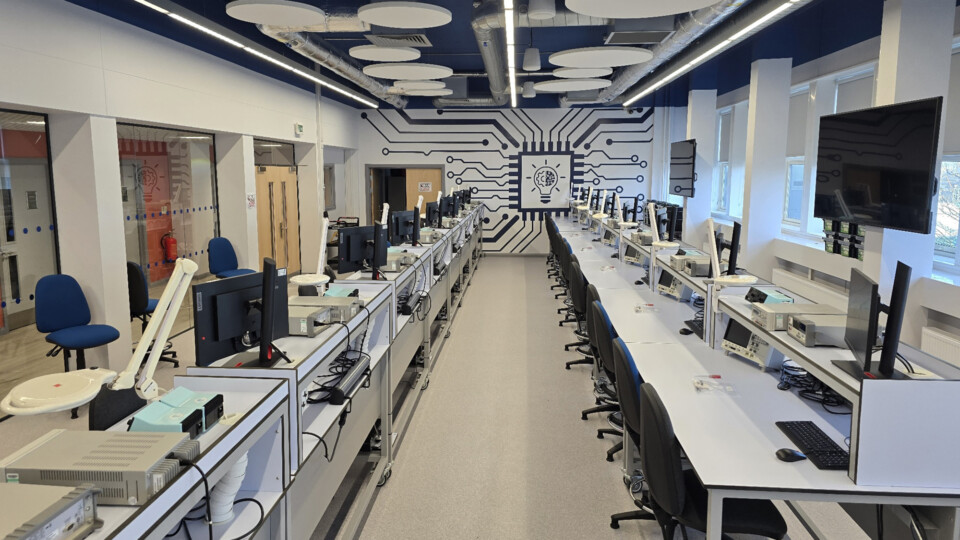£700k investment in University computer science labs
The University of Bradford’s Computer Science labs have officially opened following a £700,000 makeover.
The refurbishment has created five state-of-the-art functional labs in the University’s Horton D building, providing students with the best learning environment possible and increasing capacity to allow for future growth.
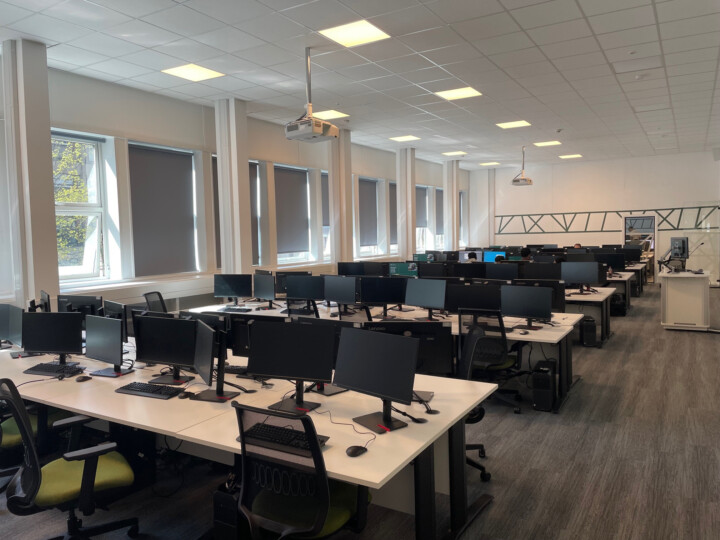
One of the computer suites which has undergone a refurbishment. Images credit: University of Bradford
Cutting-edge facilities
Professor Shirley Congdon, Vice-Chancellor of the University of Bradford, said: “This project marks a significant milestone in our journey to provide world-class learning environments for our students and staff.
“The student experience is at the heart of everything we do. These refurbished labs will provide a flexible and inclusive learning environment, allowing students to engage with technology in ways that prepare them for the ever-evolving digital landscape.
“This refurbishment is more than just an investment in physical infrastructure — it is an investment in people. By creating an exceptional learning environment, we are fostering a sense of community, enhancing job satisfaction for our staff, and supporting students in reaching their full potential.”
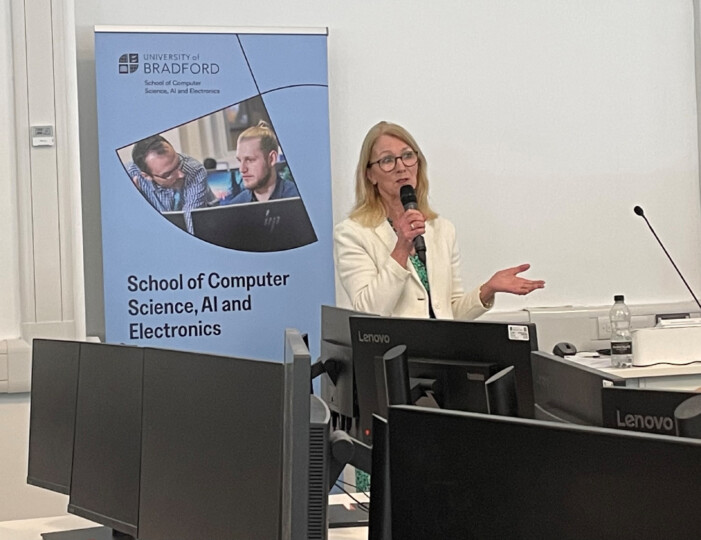
Professor Shirley Congdon, Vice-Chancellor of the University of Bradford, gives a speech at the official opening ceremony. Images credit: University of Bradford
Professor Savas Konur, Head of the School of Computer Science, AI and Electronics at the University of Bradford, said: “The new-look computer suites offer cutting-edge facilities for our students to learn and collaborate with others in.
“This investment also demonstrates the University’s commitment to not only our School but in helping us to produce the next generation of innovators in AI, computer science and electronics.”
Students have used the facilities since September 2024, while Professor Congdon officially opened the suites earlier this month.
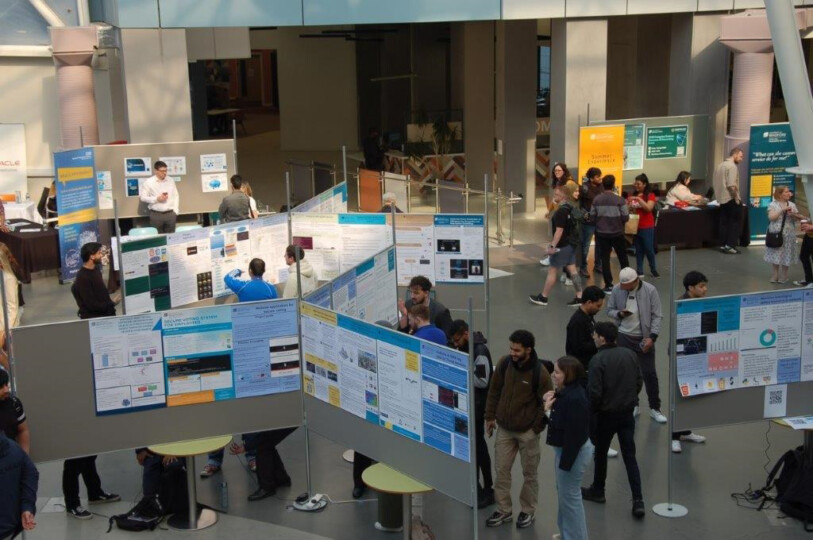
Guests viewing Computer Science student posters in the Atrium of the University’s Richmond Building. Images credit: University of Bradford
More on the Computer Science Showcase
Students looking to get on the career ladder for future roles in Computer Science showcased their work to potential employers at an event at the University.
The Computer Science Showcase and Networking Event, held in the University’s Richmond Building Atrium, saw 95 students from BSc (Hons) Computer Science for Cyber Security, BEng Software Engineering, BSc (Hons) Computer Science, BSc Applied Artificial Intelligence and BEng Software Engineering display their project work.
Projects included topics such as software testing automation, automated reconstruction of Saltaire Digital Twin heritage architecture, AI for biodiversity net gain, cyber security algorithms for assessment, developments and protection from web attacks, chatbots, cyberbullying, Wi-Fi intrusion detection, AI-powered Chatbot healthcare application that securely generates health advice, and Digital Technologies for Enhancing Visual Tracking Skills in Children with Cerebral Visual Impairment, fitness apps, more secure facial recognition on technological devices, Parkinson’s disease detection through voice analysis, and development of a user-friendly online platform for people to buy insurance services, or tailored Point of Service in the restaurant industry.
Students had the chance to meet and network with potential employers and institutions who are looking to recruit for graduate and professional job roles.
Companies and organisations who attended included Bradford Teaching Hospitals NHS Foundation Trust’s informatics department, Oracle, BJSS, Netcompany, Wavenet/CyberGuard, Pentest People (a UK-based cybersecurity consultancy firm), and Bradford-based supermarket giant, Morrisons, who showcased their graduate scheme opportunities available for 2026, Simpson Associates, Tech1 Solutions, Trinity Institute of Education and Bradford 2025.
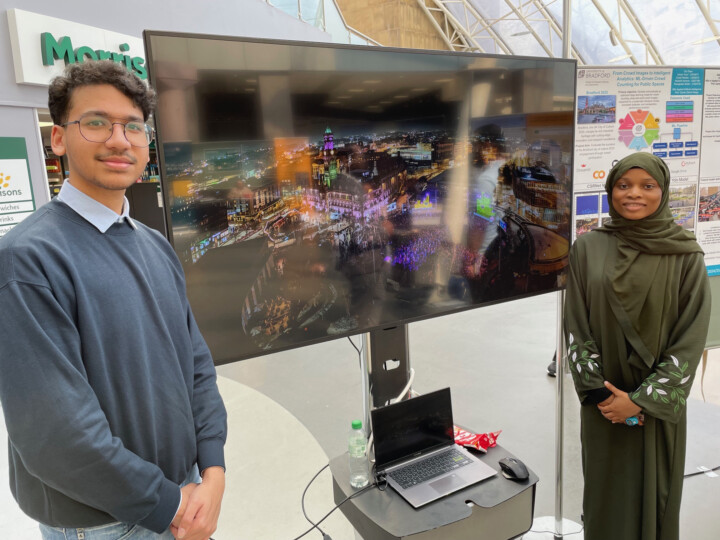
From left, students Oudat Shabbir and Uswat Yusuf who have worked on the Bradford 2025 crowd mapping project; Images credit: University of Bradford
Using AI on Bradford 2025 impact
A number of projects used AI to evaluate Bradford 2025 and the impact and attendance of its public events.
In partnership with Bradford 2025, University academics and students are using ‘Responsible AI’ to ethically ‘crowd map’ large-scale events in the city and help understand their social and environmental impact.
Students and academics used real photographs of crowds from Bradford 2025 events, including RISE, an open-air showcase of the Bradford district, held in City Park in January 2025, as a crowd engagement capture.
Professor Ciprian Daniel Neagu, Professor of Computer at the University of Bradford, said: “Students have got jobs through taking part in these showcase events in the past years, also build and show their portfolio for stepping in their professional careers.
“We are promoting the University to employers who will hopefully recruit our students. It’s a growing event, next year we will have 200 students showcasing their work.”
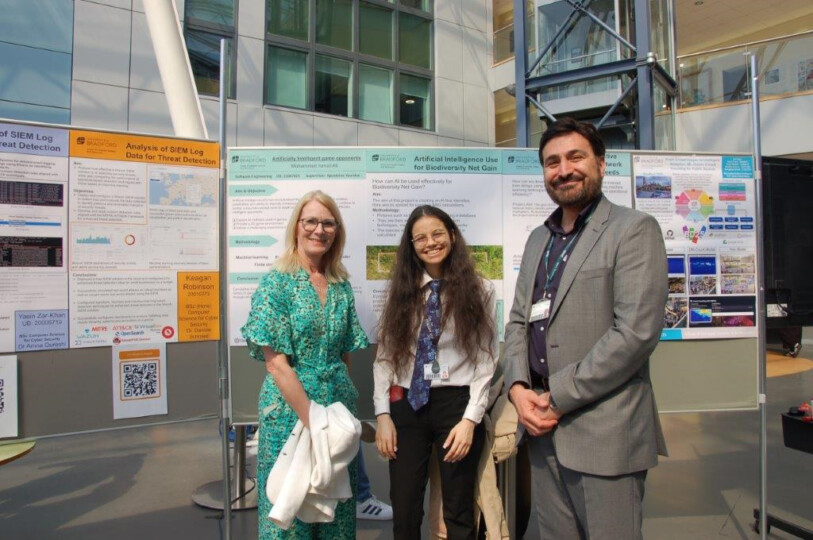
Professor Shirley Congdon and Professor Savas Konur visiting student Nadine Sjahsam’s poster. Images credit: University of Bradford
Different is what we do
UNIDENTIFIED – Creating new opportunities
The University of Bradford is a world leader in the application of machine learning and artificial intelligence, working closely with industry worldwide to translate academic knowledge into real-world impact.
Work on the Internet of Things and smart technology are some of the ways the University of Bradford is helping to identify new opportunities.
Using the latest technology and expertise, we are finding ways for AI to help save lives by identifying and assessing donor organs.
Professor Hassan Ugail, Director of the Centre for Visual Computing and Intelligent Systems, is part of OrQA (Organ Quality Assessment), which is using artificial intelligence (AI) to speed up organ transplants in a bid to save lives and money. Find out more on our website

